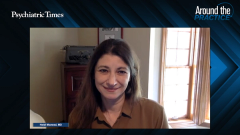
Patient Case #1: 19-Year-Old Man With Excessive Daytime Sleepiness
Thomas E. Scammell, MD, presents a case study for a college student with a history of sleepiness.
Episodes in this series

Thomas E. Scammell, MD: Let’s transition to talking about an actual clinical case, so that we can put some of these thoughts in context. This is a 19-year-old man who presented to his psychiatrist with excessive daytime sleepiness. He has been seeing his primary care physician for the last 3 years for his condition. He says that he was diagnosed with depression at age 16 when he was in high school. For that, he is taking fluoxetine 20 mg each morning. He took it as prescribed, but he now takes it every other day because he feels that his depression has improved. He still has some days when he feels depressed, but he says that is mainly because he is failing his classes and he has been put on academic probation; he does not really see it as an intrinsic problem. He has been self-medicating for the last 3 months with caffeine and energy drinks and over the counter agents to try to improve his sleepiness, but he does not find them effective. There is no history of trauma or head injury. The past history is notable for the depression, and he does have a prior history of marijuana and cocaine abuse, but he has not been using it for the past couple of months. He is currently a full-time college student. He does smoke one pack of cigarettes a day, and, as I mentioned, he is on academic probation because he is not doing well academically, which he says is because he cannot stay awake and study properly. The only medication right now is fluoxetine 20 mg and his labs are all fine.
Transcript edited for clarity
Newsletter
Receive trusted psychiatric news, expert analysis, and clinical insights — subscribe today to support your practice and your patients.












